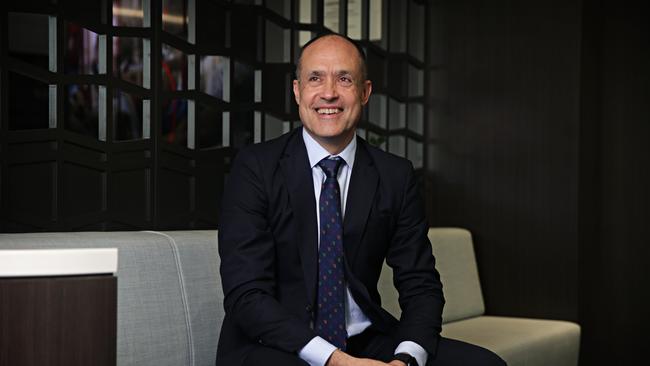TPG’s $5.25bn Vocus deal is ‘good news for Aussies’ as telco steps up fight with Telstra and Optus
TPG Telecom says the sale of its government and enterprise fixed and fibre assets will give it the cash injection needed to take on Telstra and Optus.

TPG Telecom says the $5.25bn sale of its government and enterprise fixed and fibre assets – including its NBN competitor Vision Network – will give it the cash injection needed to take on Telstra and Optus in the fiercely competitive consumer market.
TPG, Australia’s third biggest telco, announced the sale to Vocus - backed by Macquarie and Aware Super -after more than a year of on-and-off-again talks.
For Macquarie – which sealed the deal under the project names Tornado and Lighthouse (representing a light at the end of the tunnel after the storm) – it allows it to gain more exposure to the artificial intelligence boom.
When the sale is completed, Vocus will operate a network of more than 50,000km of owned and leased fibre assets and almost 15,000 of international submarine cables – providing the plumbing needed to run powerful AI platforms.
It comes after TPG halted a $6.3bn sale and leaseback of its non-fibre mobile assets with Vocus last November, citing scale and complexity. But the telco said it remained open to a deal at the time.
Under the terms of the sale agreement, Vocus and TPG will enter a long-term strategic partnership. Vocus will provide TPG with ongoing access to fibre infrastructure, which it said would deliver “enduring network planning and access certainty”.
Macquarie reaped a bonanza last month when it sold data centre operator AirTrunk for $24bn – eight times more than it was worth when it bought into the business in 2020 – to US private equity titan Blackstone.
If AirTrunk represents the engine of the AI boom, with its data centres housing the powerful chips needed to run large language models, then Vocus represents the fuel lines, carrying the copious amounts of data that feeds artificial intelligence.
“That’s a great way of framing it,” Macquarie Asset Management co-head of infrastructure Ani Satchcroft said.
“This is why we invest holistically across the sector because we can see a lot of those touch points and contact points, and knowledge of the entire ecosystem helps us be better investors in any single part.”
AirTrunk chief executive Robin Khuda says he can now turn the company into a $100m business, as his main customers – the world’s biggest tech companies, including Microsoft, Google, Amazon and Oracle – look to spend $US1 trillion on AI infrastructure in the next five years. This also bodes well for Vocus.
For TPG, chief executive Iñaki Berroeta said the sale represented a “simpler operating model” to the 2023 talks – hence the $1bn drop in Vocus’s original offer – and was a great outcome for large customers for fixed telecommunications services in Australia.
“The transaction reflects a smaller asset perimeter compared with the original discussions with Vocus in 2023, resulting in a simpler operating model than was envisaged in the original discussions,” Mr Berroeta said.
“The deal unlocks the value of our fixed infrastructure assets while strengthening our financial position and creating a more focused and streamlined business with significant
optionality for the optimisation of our capital structure.”
Specifically, this give TPG the fire power to turbocharge its consumer business, which represents about 80 per cent of its earnings, allowing it to take on Australia’s biggest telco Telstra and No.2 Optus.
TPG anticipates the Transaction will deliver net cash proceeds of $4.65-$4.75bn, which will support future capital management and business investment initiatives.
“This is also a great outcome for large customers for fixed telecommunications services in Australia. The transaction will create a challenger of scale in the enterprise connectivity sector with strength in international, inter-capital, regional and metropolitan connectivity,” Mr Berroeta said.
“It will also extend Vocus’ premium connectivity and collaboration offerings to TPG Telecom’s Enterprise, Government and Wholesale fixed customers. We look forward to a long-term partnership with Vocus that will support TPG Telecom’s ambition to be Australia’s best telco.
“We are committed to working as efficiently as possible with Vocus and regulators to bring the transaction to completion and providing the smoothest possible transition for our enterprise, government and wholesale fixed customers and the approximately 560 TPG people who will transition to Vocus.”
TPG shares fell 4.1 per cent to $4.88 on Monday.
Details of such future initiatives have not yet been determined and remain subject to development. TPG anticipates providing more detail to the market around the time of Transaction completion.
The Transaction includes TPG entering a transmission and wholesale fibre access (TAWFA) Agreement with Vocus under which Vocus will provide network services to TPG for a fee of $130m per annum.
The TAWFA has an initial 15-year term with two 10-year extensions at TPG’s election and is designed to ensure TPG maintains “owner economics” of the fibre network, meaning pricing is non-volumetric and increased only in relation to indexed and capped inflation and network expansion requiring the deployment of new physical infrastructure.
TPG expects about half of the TAWFA payment will be accounted as a lease expense and the remainder recognised within EBITDA.
The parties are targeting completion of the Transaction in the second half of 2025 subject to satisfaction of conditions precedent, including regulatory approvals.
Aware Super head of infrastructure Mark Hector said: “We are pleased to partner with Macquarie Asset Management on this transformational transaction for Vocus”.
“This agreement enhances the competitiveness of Vocus in the Australian digital infrastructure sector, offering its customers a greater breadth of services and end to end connectivity,” he said.
“It also strengthens the Aware Super digital infrastructure portfolio, a strategic focus for Aware and an area of investment we continue to pursue domestically and offshore in Europe and the US.”




To join the conversation, please log in. Don't have an account? Register
Join the conversation, you are commenting as Logout